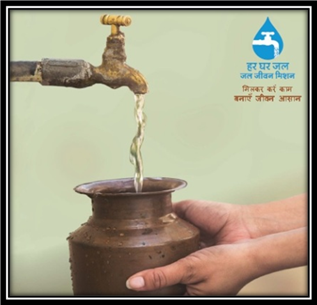
As part of the Jal Shakti Ministry’s mid- term review of progress of implementation of Union Government’s flagship programme Jal Jeevan Mission in all States and UTs, officials from Tamil Nadu presented the status of planning and implementation of the mission in the State before the National Jal Jeevan Mission through video conferencing. The Ministry of Jal Shakti has been working with the States/ UTs to implement the Mission, which aims to improve the lives of rural people especially women and girls by reducing their drudgery. Funds are provided by the Union Government based on the output in terms of household tap connections provided and utilization of available central and matching State share.
Tamil Nadu is planning 100% tap water connections to all rural households by 2022-23. The State has around 126.89 lakh rural households, out of which 98.96 lakh households have not been provided with tap water connection. In 2020-21, the State is planning to enable 33.94 lakh households with tap water connections. The mid-term review highlighted the need for analysing the existing Piped Water Supply (PWS) schemes in 1,576 villages, where not a single connection has been provided. Tamil Nadu State has planned to provide safe drinking water to remaining 236 Fluoride affected habitations with population of 1.18 lakh by December, 2020. The State has 22.57 lakh households vulnerable to JE/AES, and only 4.07 lakh households have been provided with tap connection. The State was urged to pay undivided attention for universal coverage of aspirational districts; SC/ ST dominated villages, villages under Sansad Adarsh Gram Yojna (SAGY).
As Jal Jeevan Mission is a decentralized, demand-driven, community-managed programme, the local village community/ Gram Panchayats or user groups have to play key role in planning, implementation, management, operation and maintenance of water supply systems in villages to ensure long-term sustainability. The State was requested to undertake IEC campaign along with community mobilization in all villages to make Jal Jeevan Mission, truly a people’s movement. Women self-help groups and voluntary organisations are to be engaged to mobilize the rural community for creation of in-village water supply infrastructure as well as for their operation and maintenance.
Union Government is committed to provide full assistance to the State Government in their efforts to achieve this goal of universal coverage of water supply to each household. In 2020-21, Centre has allocated ₹ 921.99 Crore to Tamil Nadu under Jal Jeevan Mission and State already has unspent balance of ₹ 264.09 Crore. State was urged to speed up the implementation and utilize the available funds to avail the allocated funds so as to avoid losing the central grants.
Further, 50% of the 15th Finance Commission Grants to PRIs is to be spent on water and sanitation. Tamil Nadu has been allocated ₹ 3,607 Crore as FC Grants in 2020-21, 50% of which i.e. ₹ 1,803.5 Crore is tied grant for Water and Sanitation. Besides, the State should also well utilize their available funds through convergence of various programmes like MGNREGS, SBM (G), District Mineral Development Fund, CAMPA, CSR Fund, Local Area Development Fund, etc for holistic planning at village level to ensure judicious use of funds.
State was requested to ensure all the anganwadi centres, ashramshalas and schools are provided piped water supply as part of the special 100-day campaign has been launched on 2nd October, 2020, so that potable water is available in these institutions for drinking, hand washing, for use in toilets and for cooking of mid-day meals. This campaign offers a golden opportunity to provide safe water in these public institutions, so that children have access to safe water, which will improve their health and well-being.
*****
APS/MG/AS



